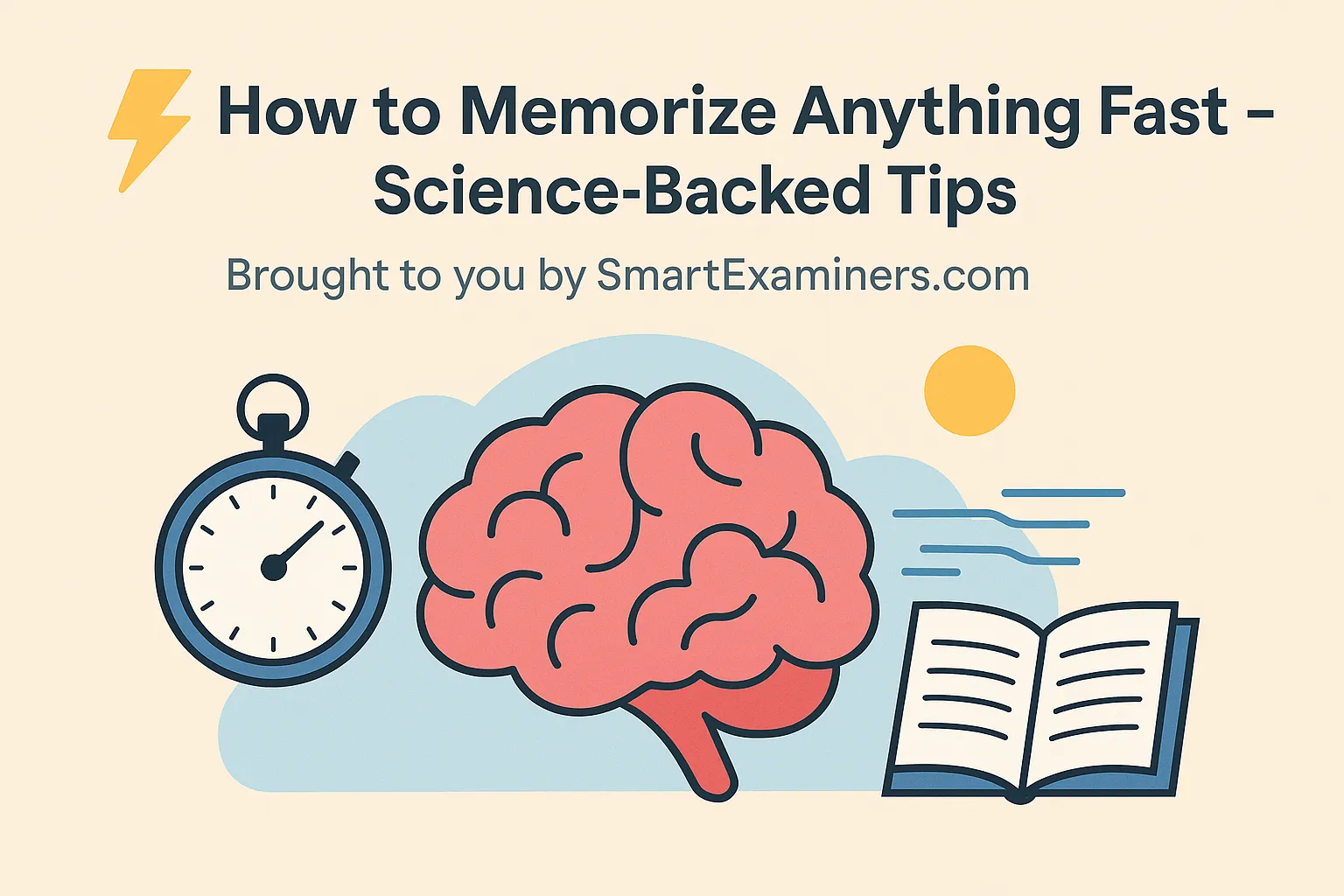⚡ How to Memorize Anything Fast – Science-Backed Tips
Brought to you by SmartExaminers.com – the AI-powered tool for generating curriculum-aligned exams and answers you can download instantly.
⏱️ Why Speed Matters in Memorization
We’ve all been there: cramming the night before a test, needing to remember a speech for an event, or trying to retain last-minute info for an interview. In moments like these, speed matters.
But is it possible to memorize things quickly without compromising retention? Yes – and it’s all about using how your brain naturally works, powered by science-backed techniques.
This blog dives deep into powerful strategies you can use today to memorize content faster — and keep it stored longer. 🧠💨
Let’s break it down.
🧠 1. Use the Primacy and Recency Effect
The brain naturally remembers the first and last things better than the middle — it’s called the serial position effect.
How to Hack It:
- Break study sessions into short bursts (20–30 minutes).
- Review summaries or flashcards at the start and end of each session.
- During revision, front-load and back-load your schedule.
📌 Quick wins: prioritize important info at the beginning and end.
🗣️ 2. Say It Out Loud
Speaking what you’re trying to remember activates auditory memory, engaging more areas of your brain.
How to Apply:
- Teach the content as if you're explaining it to a friend.
- Read notes or flashcards out loud.
- Try "blurting": open a notebook and write everything you remember aloud.
🎤 Bonus: Record yourself and listen during walks or chores.
🔁 3. Use the Spaced Repetition + Active Recall Combo
This combo is the gold standard of fast and long-term learning.
Science Says:
- Spaced repetition optimizes when you review.
- Active recall forces your brain to retrieve, not just recognize.
Use Tools Like:
- 🃏 Anki, RemNote, or Brainscape
- 🧪 Or generate AI questions using SmartExaminers to quiz yourself based on your syllabus!
🧩 This method multiplies memorization speed and depth.
🎯 4. Focus on Meaning, Not Just Rote Memory
The brain remembers meaningful information better than raw data.
Example:
- Hard to remember: “C6H12O6”
- Easier: “This is glucose, what plants make via photosynthesis!”
Apply This:
- Link facts to real-life examples.
- Ask: "Why does this matter? Where have I seen this?"
💡 The more connections = faster encoding.
✍️ 5. Use Pen and Paper First
Digital tools are great, but the physical act of writing helps consolidate memory.
How To:
- After reading a topic, write it in your own words.
- Sketch quick diagrams or timelines.
- Practice active recall by writing answers from memory.
📝 Writing slows you down, but speeds up retention.
📱 6. Leverage Smart Technology (Like SmartExaminers)
Not everything has to be manual — you can learn faster using AI-powered tools.
Why SmartExaminers Helps:
- Create personalized study questions from any topic or subject.
- Generate curriculum-aligned answers for self-quizzing.
- Download results in editable Word format for offline study.
- Supports UK, USA, CBC, 8.4.4, Cambridge curricula.
🧠 Fast learning needs fast tools — and SmartExaminers is built for speed and accuracy.
➡️ Try it now and make every second of study count.
🎭 7. Turn Info into Visuals or Stories
Humans are wired for visual memory and storytelling. Turn plain facts into images or narratives.
Try This:
- Mind maps
- Flashcard diagrams
- Story-style mnemonics: “King Philip Came Over For Good Soup” (Taxonomy)
🎨 We remember pictures better than paragraphs.
🛑 8. Eliminate Distractions for Faster Encoding
The more focused you are, the faster you absorb info.
Set the Stage:
- Pomodoro technique: 25 mins focus, 5 mins break.
- Airplane mode on phone
- Use apps like Forest, Focus To-Do, or Cold Turkey
🎧 Bonus: Try focus music or binaural beats.
🚿 9. Review While Doing Routine Tasks
Use low-effort activities to reinforce memory.
Example:
- Recite facts during shower, brushing teeth, or walking.
- Listen to audio notes in the car or while exercising.
🧠 These moments become “free reps” for your brain.
💤 10. Sleep Immediately After Studying
Sleep isn’t just rest — it’s when your brain solidifies memories.
Try This:
- Quick review right before bed.
- No cramming after 10PM — just reinforce what you already studied.
- Get 7–9 hours of sleep minimum.
😴 No sleep = no storage.
🎓 Conclusion: Fast Memorization Is a Formula
Memorizing faster isn't about talent — it’s about process. Use a mix of these methods to find what works best for you.
And remember, with AI tools like SmartExaminers, you're not alone — you can practice with realistic, auto-generated questions, in your own curriculum, and download everything in a click. 🧠✨
👉 Ready to master fast learning? Explore SmartExaminers today and get ahead in school, work, and life.
🔁 Related Content You’ll Love:
- 10 Proven Memorization Techniques That Actually Work
- Top Study Methods Used by High-Scoring Students
- How to Create an AI-Powered Study Plan with SmartExaminers
💬 Let us know in the comments: What’s YOUR go-to trick for memorizing fast?
SmartExaminers: Smart learning, made simple. 🧠📄
 SmartExaminers
SmartExaminers


